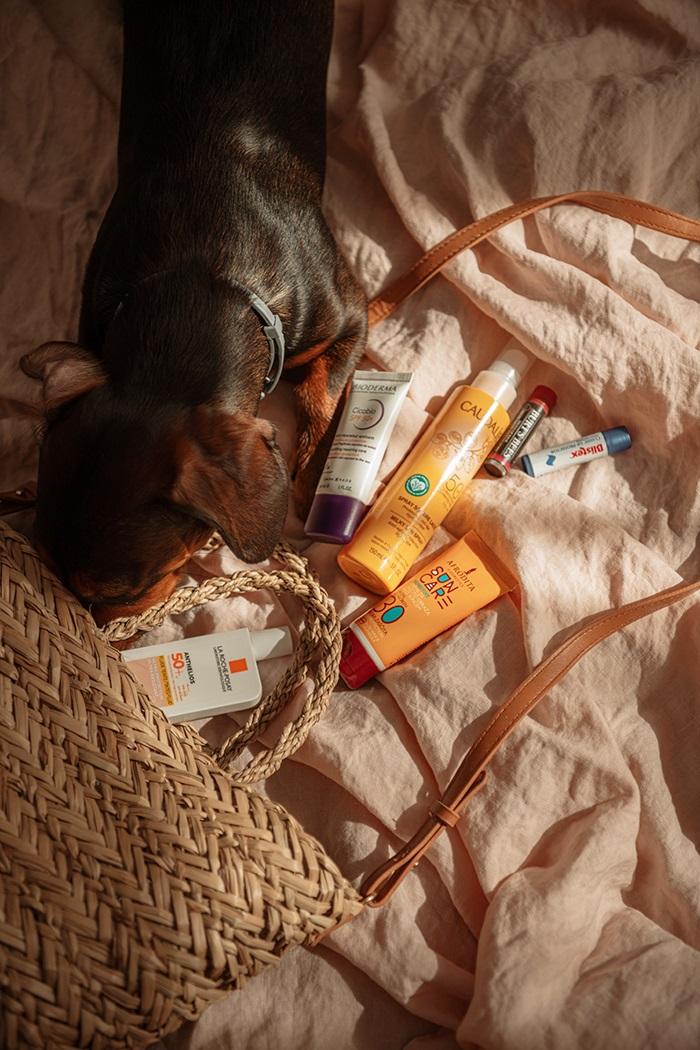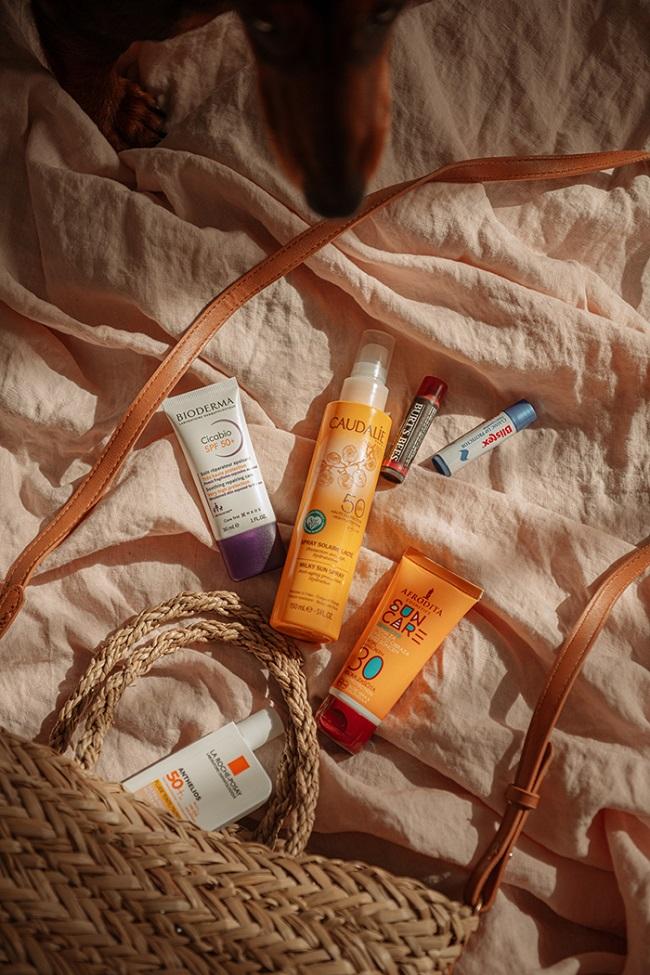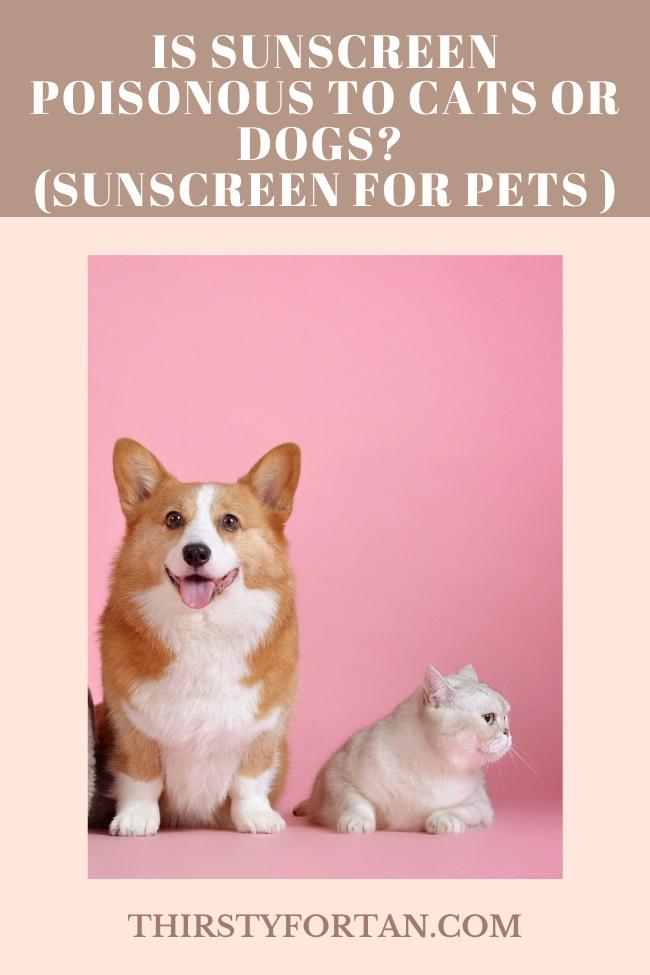Whether you’re a cat person, a dog person, or you love both equally as much, there’s no debate that you want to know exactly what is or isn’t dangerous for your beloved pet. If you’re wondering where sunscreen stands in this circumstance, here is what you need to know.
What are the common sunscreen ingredients?
If you want to understand whether or not something is toxic to animals (or humans), it’s important that you first understand the ingredient list, or at least the main, common ones, as it’ll be one or more of these which makes the product toxic. Remember to keep in mind that this is a general overview of common ingredients found in sunscreens, but yours may contain something extra, or not contain some of the ingredients here, which are both totally fine, too! It’s also good to keep in mind that some ingredients will have different names, especially if they’ve got a bad reputation so, if you’re curious about what one of them is, you can always do a little research of your own!
UV filters
Beginning with the first, and arguable most important category, UV filters are the active ingredients found in sunscreens to make them effective at shielding your skin from the Sun. There are lots of different UV filters available, and they have varying reputations. Two mineral filters, titanium dioxide and zinc oxide, are known to be the safest ones, and they’re completely free from any side effects, so these are the best ones to be using. Others include:
- Oxybenzone
- Avobenzone
- Homosalate
- Octocrylene
- Octinoxate
Humectants and occlusives
As you’ve probably never heard of these words before, it’s worth explaining what a humectant is, and that is essentially a hydrating agent which, when it is applied to your face, attracts water. An occlusive is an ingredient which prevents water loss, rather than attracting water to your face, so these two categories work well together. Some of these include:
- Hyaluronic acid
- Glycerin
- Dimethicone (and other ingredients ending in ‘cone’)
- Petrolatum
- Propylene glycol
- Butylene glycol
Preservatives
As the name suggests, preservatives are included in skin care products (as well as other products such as food or other toiletries), and they have been very controversial as there is debate over whether some of them are safe or not. Nevertheless, some preservatives found in sunscreen are:
- Formaldehyde
- Phenoxyethanol
- Caprylyl glycol
- Salicylic acid
- Glycerin
Parabens
Parabens have been used in cosmetics and toiletries for years, and they work in the same way as a preservative, but there has been a lot of worry about them, as scientists have proven that they can interfere with your hormones. So, it’s best to avoid parabens, including:
- Methylparaben
- Propylparaben
- Isopropylparaben
- Anything ending in ‘paraben’
Is sunscreen poisonous to cats or dogs?
Now that you’ve found out about which ingredients are found in sunscreens, you’ll probably have a little more understanding about what’s really there in the products you’re using. You probably feel safe and reassured that the products you’re using are completely healthy and safe for your own use, especially since sunscreens are highly advertised as effective ways to protect you from the dangerous rays that come from the Sun.
The first concern when it comes to sunscreen and cats or dogs (or other pets, for that matter) is the worry about the various chemicals and what they can do to your pet’s skin and body over a long period of time, as in, their entire lifetime. This anxiety is also consistent for humans, too, but there are more studies that relate to this for us, and more evidence to prove that there’s no danger. Animals such as these domestic ones are also much smaller than humans, and this means their tolerances to foreign, potentially harmful, substances are much lower, so it’s easy to see why confusion or worry can arise.
However, studies have shown that, due to the fact their lifespan is also significantly lower than that of a human, cats and other pets are at no real risk of developing any disease or conditions due to sunscreen that are a cause for alarm. So, there absorption of sunscreen through the skin is nothing to worry about. This is assuming that you are using a pet-safe sunscreen (which we’ll talk about in more detail later).
One thing you should be cautious of with sunscreens on the skin is ones which contain zinc oxide, a vary common mineral sunscreen ingredient due to its great benefits for humans and the environment. However, after repeated use of zinc on your animal’s skin, they can develop something known as zinc toxicity, which damages the red blood cells around the body, which brings a variety of problems along with it.
Although you are clear from this, the bigger danger to your household pets is actually the possibility of them ingesting the product itself, even if it’s just in small quantities. The smaller your cat or dog is, the more likely they are to suffer more severe symptoms and side effects of consuming a certain amount of sunscreen, and the lighter they weigh or smaller they are, the less tolerant they’ll be. As well as the potential for your dog, in particular, to get hold of your sunscreen and chew the bottle up, whilst also licking up the contents, even just licking enough of it off of your skin after it’s applied can be a problem, especially if it contains harmful ingredients.
In many sunscreens, you’ll be able to find salicylates on the ingredients list, a group of ingredients incorporates in various formulas, which are used for different reasons, but they bring the biggest dangers to your pets. In unusual circumstances, there is a chance that these salicylates can cause stomach ulcers and damage the liver, but this has been shown to be very rare, and it’s only possible if the concentration is high enough, or enough of the product has been consumed.
When sunscreen is consumed by your pet, the zinc can also trigger common reactions that also are known to come with other unhealthy substances entering the body. These include stomach upset, vomiting and even diarrhea. Your pet may also develop an allergic reaction, and this could even lead to hives or face swelling.
Also read:
Is Sunscreen Bad for You? (Tips To Prevent The Danger)
Does Sunscreen Attract or Repel Bugs? (Explained)
Do I need to use sunscreen on my pet?
Many people have also considered using sunscreen on their pets, but there is a lot of controversy about this for many different reasons, as you can probably imagine. Science hasn’t exactly given us all of the answers yet, so it’s better to stay as safe as you can to protect your pets.
- Protects from Sun
- Skin and coat conditioner
- Soothing sun protection for dogs - You reduce the effects of the sun on your skin with sunscreen, so don't neglect your four-legged friends. Our dog sunscreen is a proprietary formula designed to moisturize and nourish the skin and coat, while providing effective sun protection for dogs. Dog sun protection is vital for any outdoor activity and a must-have addition to your dog beach accessories
- All-purpose defense for all breeds - Short, thin, white or pink skinned canines will benefit from our sun protection for dogs. Emmy's Best Pet Products is essential beach gear for dogs, and a valuable hiking or camping accessory. Shea Butter and Coconut Oil deeply moisturize to avoid drying, while other effective ingredients offer reassurance and security for your faithful companion
- Multi-award winning body sunscreen with advanced protection in a fast-absorbing, velvety texture that leaves skin hydrated and smooth. Broad Spectrum SPF 60
- Allure 2022 Best of Beauty Award Winner. Water resistant (80 minutes)
If you click Buy on Amazon and make a purchase, I'll earn a small commission at no additional cost to you.
However, it is a proven fact that any animals with white hair, or very light blonde, are much more likely to develop skin cancer than those with darker fur, as this doesn’t protect their skin from the Sun as much as a darker colour does, leaving their skin exposed. For this reason, it’s advised that you apply a little bit of pet-safe sunscreen (which you should definitely do your research about) onto any lighter or bald areas of the body, as well as the ears.
You can also protect your pet by keeping them inside, away from direct sunlight, during warmer parts of the day, and avoid walking them when it’s too hot and sunny, but this is something you should avoid anyway.
Final thoughts
In the end, sunscreen is technically ‘poisonous’ for cats and dogs if they ingest it, but it isn’t damaging enough to cause fatality, and will just cause a little upset instead. Nevertheless, you should still keep an eye on your pet, as you should protect them from any potential danger, and this is the best way to do so. You can also apply a pet-safe sunscreen to protect them from the Sun itself, but make sure to do all your research before putting this into practice.








